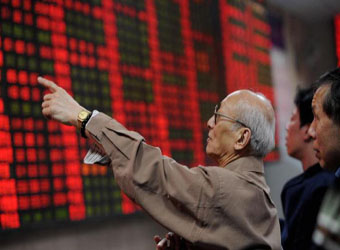Shares in China took a tumble on Monday after regulatory curbs on aggressive share purchases by insurers ahead of the highly-anticipated FOMC’s two-day meeting starting Tuesday, while politics dominated news flows in other markets.
Shares in China plunged after the insurance regulator said late last Friday that it would curb “barbaric” stock acquisitions by insurers, Reuters reported. The Shanghai composite dropped 2.12 percent as the Shenzhen composite fell 2.97 percent.
In Hong Kong, the Hang Seng fell 1.13 percent.
In other news in Hong Kong, the special administrative region’s Financial Secretary John Tsang resigned from his post after announcing that he would run for the role of chief executive.
In Australia, the benchmark ASX 200 closed up 0.14 percent, or 7.779 points, at 5,568.4. Its energy sub-index at its highest since October 2015, up 3.01 percent.
New Zealand’s NZX 50 closed down 0.25 percent, or 17.26 points, at 6,876.04 as the country’s ruling party announced Bill English as the new prime minister, following the surprise resignation of John Key last Monday.
In South Korea, the Kospi was up 0.06 percent, as South Korea struggles with a corruption scandal which led to the a parliamentary vote on Friday to impeach incumbent President Park Geun-hye. South Korea’s finance minister warned on Sunday that the impeachment could weigh on sentiment in the east Asian country’s economy.
South Korean prosecutors have also indicted two former government officials, one a former senior presidential aide and another a former vice minister.
The Japanese benchmark was an exception among regional markets, with the Nikkei 225 up 0.9. percent, as the yen weakened against the dollar, trading at 115.46 as of 1:05 pm HK/SIN, compared to levels around 113 last week.
Oil prices soared in early Asian trade, as investors react to the weekend’s news of the Organization of Petroleum Exporting Countries (OPEC) and non-OPEC countries led by Russia arriving at their first output cutting agreement in Vienna, a first since 2001. The deal will help to ease a global supply glut after more than two years of low prices.
U.S. crude soared 4.76 percent to $53.95 a barrel during Asian trade, as Brent crude jumped 4.2 percent to $56.61.
Major oil companies in the region were higher. Australia’s Santos added 5.12 percent to A$4.52 and Oil Search was up 3.62 percent at A$7.16 each share, Japan’s Inpex was up 0.52 percent to 1,254.5 yen and Japan Petroleum Exploration was up 3.94 percent at 2,899 yen. Hong Kong-listed CNOOC was up 0.58 percent at $10.32 and China Petroleum was up 1.66 percent at 5.5 yuan.
However, whether countries will comply with the production cuts remain a question.
“The question of whether the production agreements are adhered to is one for the future. At this stage the safe assumption is that they will be, especially in the first few months,” said Ric Spooner, chief market analyst at CMC Markets, in a note on Monday.
U.S. major indexes posted their best week since the election on November 8 and were at all-time highs. The Dow, S&P 500 and Nasdaq also rose each day for the last trading week, something that has not been seen since September 2011.
The Dow Jones industrial average climbed 0.72 percent to 19,756.85. The S&P 500 index rose 0.59 percent to 2,259.53, while the Nasdaq composite was up 0.5 percent at 5,444.5.
Investors will also look ahead to the two-day Fed meeting starting Dec. 13 where the U.S. central bank is largely expected to raise interest rates. The probability of a December move is priced at 94.9 percent, according to the CME Group 30-Day Fed Fund futures.
In the currency market, the greenback held steady against a basket of currencies to trade at 101.56, from levels as low as 100.58 last week.
Markets in Malaysia, Thailand and Indonesia are closed for holidays.
Source: CNBC


